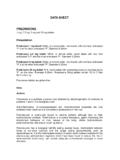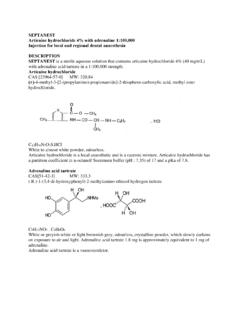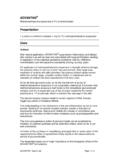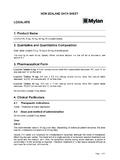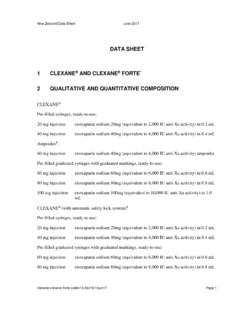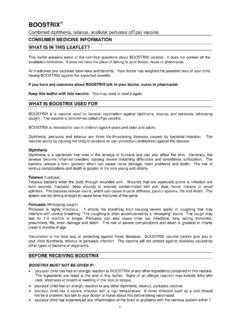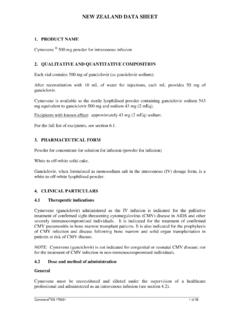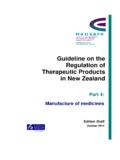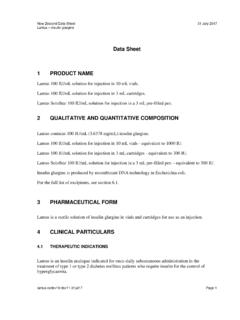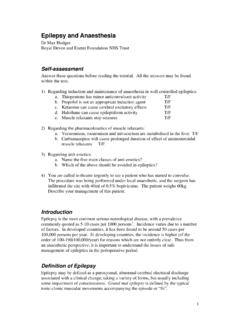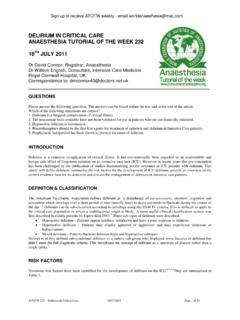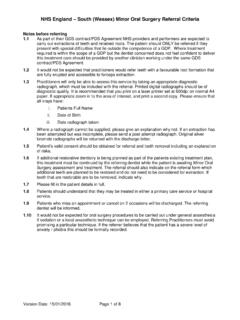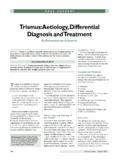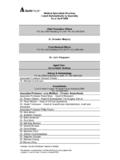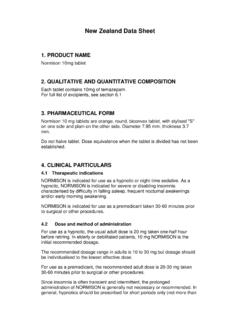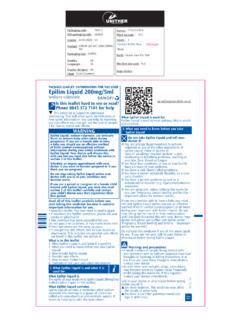Transcription of NEW ZEALAND DATA SHEET MESTINON® - Medsafe
1 NEW ZEALAND DATA SHEET . mestinon . 1 PRODUCT NAME. mestinon 60 mg Tablets 2 QUALITATIVE AND QUANTITATIVE COMPOSITION. Each tablet contains 60 mg pyridostigmine bromide. Excipients with known effect: Lactose For a full list of excipients see section 3 PHARMACEUTICAL FORM. Tablet Round, flat-faced, white tablets engraved " mestinon 60" on outer perimeter and "V" in the centre, with a quadrisect score on the reverse. 4 CLINICAL PARTICULARS. Therapeutic indications Myasthenia gravis, paralytic ileus, and postoperative urinary retention. Dose and method of administration mestinon tablets are for oral administration. mestinon has a gradual onset of effect (generally 30- 60 minutes). Myasthenia Gravis Adults Doses of 30 to 120 mg by mouth are given at intervals throughout the day when maximum strength is needed (for example on rising and before meal times). The usual duration of action of a dose is three to four hours in the daytime but a longer effect (six hours) is often obtained with a dose taken on retiring for bed.
2 The total daily dose is usually in the range of 5-20 tablets but some patients may require doses higher than these. Paediatric Population Children under 6 years old should receive an initial dose of half a tablet (30 mg) of mestinon . Children 6-12 years old should receive one tablet (60 mg). Dosage should be increased gradually, in increments of 15-30 mg daily, until maximum improvement is obtained. Total daily requirements are usually in the range of 30-360 mg by mouth. Newborn Infants Neostigmine has generally been preferred in the treatment of neonatal myasthenia. However mestinon can be given, particularly if neostigmine proves unsuitable on account of pronounced cholinergic effects. mestinon Page 1 of 8. NEW ZEALAND DATA SHEET . mestinon . The dosage requirements of mestinon range from 5-10 mg orally every four hours, given 30-60. minutes before feeding. Treatment is not usually required beyond eight weeks of age except in the rare conditions of congenital and familial infantile myasthenia.
3 Other indications (paralytic ileus, post-operative urinary retention). Adults The usual dose is 1 to 4 tablets by mouth. Children The dosage is 15 to 60 mg per day by mouth. The frequency of these doses may be varied according to the needs of the patient. Special Populations Elderly There are no specific dosage recommendations for mestinon in elderly patients. Renal impairment mestinon is mainly excreted unchanged by the kidney, therefore lower doses may be required in patients with renal disease and treatment should be based on titration of drug dosage to effect. Hepatic impairment There are no specific dosage recommendations for mestinon in patients with hepatic impairment. Contraindications mestinon is contraindicated in patients with: Known hypersensitivity to the active substance, bromides or to any of its excipients listed in section Mechanical gastrointestinal or urinary obstruction. mestinon should not be used in conjunction with depolarising muscle relaxants such as suxamethonium as neuromuscular blockade may be potentiated and prolonged apnoea may result.
4 Special warnings and precautions for use Hypersensitivity reactions may occur in susceptible individuals. Extreme caution is required when administering mestinon to patients with bronchial asthma. Care should be taken in patients with: Bradycardia Recent coronary occlusion Hypotension Vagotonia Epilepsy or Parkinsonism. There is no evidence to suggest that mestinon has any special effects in the elderly. However, elderly patients may be more susceptible to dysrhythmias than the younger adult. mestinon is mainly excreted unchanged by the kidney, therefore lower doses may be required in patients with renal disease and treatment should be based on titration of drug dosage to effect. mestinon Page 2 of 8. NEW ZEALAND DATA SHEET . mestinon . mestinon should not be given during cyclopropane or halothane anaesthesia ; however, it may be used after withdrawal of these agents. The requirement of mestinon is usually markedly decreased after thymectomy or when additional therapy (steroids, immunosuppressant medicines) is given.
5 When relatively large doses of mestinon are taken by myasthenic patients it may be necessary to give atropine or other anticholinergic medicines to counteract the muscarinic effects. It should be noted that the slower gastrointestinal motility caused by these medicines may affect the absorption of oral mestinon . In all patients the possibility of 'cholinergic crisis' due to overdosage of mestinon , and differentiation from 'myasthenic crisis' due to increased severity of the disease, must be borne in mind. Both types of crisis are manifested by increased muscle weakness, but whereas myasthenic crisis may require more intensive anticholinesterase treatment, cholinergic crisis calls for immediate discontinuation of this treatment and institution of appropriate supportive measure, including respiratory assistance. Patients with rare hereditary problems of galactose intolerance, the Lapp lactase deficiency or glucose-galactose malabsorption should not take this medicine.
6 Interaction with other medicines and other forms of interaction Immunosuppressant drugs The requirement for pyridostigmine bromide could be decreased when additional therapy (steroids, immunosuppressant drugs) is given although peak plasma concentration and AUC of pyridostigmine may decrease by high doses of corticosteroids. Antimuscarinics Atropine and hyoscine antagonise the muscarinic effects of pyridostigmine bromide. Muscle relaxants Pyridostigmine antagonises the effect of non-depolarising muscle relaxants ( pancuronium and vecuronium). Pyridostigmine may prolong the effect of depolarising muscle relaxants ( suxamethonium). Fertility, pregnancy and lactation Pregnancy Category C. The safety of mestinon during pregnancy or lactation has not been established. The maternal requirement for this medicine in the context of myasthenia gravis may be absolute. Cholinergic effects in the neonate are rare. Although the possible hazards to mother and child must be weighed against the potential benefits in every case, experience with mestinon in pregnant patients with myasthenia gravis has revealed no untoward effect of the medicine on the course of pregnancy.
7 mestinon Page 3 of 8. NEW ZEALAND DATA SHEET . mestinon . As the severity of myasthenia gravis often fluctuates considerably, particular care is required to avoid cholinergic crises due to overdosage of the medicine, but otherwise management is no different from that in non-pregnant patients. Lactation Observations indicated that only negligible amounts of mestinon are secreted in breast milk;. nevertheless, due regard should be paid to possible effects on the breast-feeding infant. Effects on ability to drive and use machines Due to miosis and accommodation disorders caused by pyridostigmine bromide or an inadequate treatment of myasthenia gravis, mestinon may impair visual acuity and consequently the ability to react as well as the ability to drive and use machines. Undesirable effects As with all cholinergic products, mestinon may have unwanted functional effects on the autonomic system. Muscarine-like adverse effects may be exhibited as nausea, vomiting, diarrhoea, abdominal cramps, increased peristaltic and increased bronchial secretion, salivation, bradycardia and miosis.
8 The primary nicotinic effects are muscle spasms, fasciculation and muscular weakness. Adverse reactions are listed below according to system organ class and frequency. Frequencies are defined according to the following convention: Very Common ( 1/10), Common ( 1/100 to <1/100), Uncommon ( 1/1000 to < 1/100), Rare ( 1/10,000 to <1/1000), Very rare (<1/10,000), Not known (cannot be estimated from the available data). Eye disorders Frequency not known: Miosis, increased lacrimation, accommodation disorders. Cardiac disorders Frequency not known: Arrhythmia (including bradycardia, tachycardia, AV block), as well as syncope and hypotension (see section ). Respiratory, thoracic and mediastinal disorders Frequency not known: Increased bronchial secretion combined with bronchoconstriction. Gastrointestinal disorders Frequency not known: Nausea, vomiting, diarrhoea, abdominal cramps, gastrointestinal hypermotility, salivary hypersecretion.
9 Skin and subcutaneous tissue disorders Frequency not known: Rash (disappears usually soon after ceasing of the medicine. Bromide containing medicines should no longer be used.), hyperhydrosis. Musculoskeletal and connective tissue disorders Frequency not known: Increased muscle weakness, fasciculation, tremors and muscle cramps or muscle hypotonia (see section ). Renal and urinary disorders mestinon Page 4 of 8. NEW ZEALAND DATA SHEET . mestinon . Frequency not known: Urinary urgency Because these symptoms may be an indication of cholinergic crisis, the physician should be notified immediately to clarify the diagnosis (see section ). Reporting of suspected reactions Reporting suspected adverse reactions after authorisation of the medicine is important. It allows continued monitoring of the benefit/risk balance of the medicine. Healthcare professionals are asked to report any suspected adverse reactions Overdose Signs of overdosage due to muscarinic effects may include abdominal cramps, increased peristalsis, diarrhoea, nausea and vomiting, increased bronchial secretions, salivation, diaphoresis and miosis.
10 Nicotinic effects consist of muscular cramps, fasciculation and general weakness. Bradycardia and hypotension may also occur. Artificial ventilation should be instituted if respiration is severely depressed. Atropine sulphate 1 to 2 mg intravenously is an antidote to the muscarinic effects. For advice on the management of overdose please contact the National Poisons Centre on 0800. POISON (0800 764766). 5 PHARMACOLOGICAL PROPERTIES. Pharmacodynamic properties Pharamcotherapeutic group: Nervous system, parasympathomimetics, anticholinesterases, pyridostigmine. ATC Code: N07AA02. mestinon is an antagonist to cholinesterase, the enzyme that normally destroys acetylcholine. mestinon can briefly be described, therefore, as the potentiation of naturally occurring acetylcholine. mestinon has a more prolonged action than neostigmine although it is somewhat slower to take effect (generally taking 30-60 minutes). Because it has a weaker 'muscarinic' action than neostigmine, it is usually much better tolerated by myasthenic patients in whom the longer action is also an advantage.
